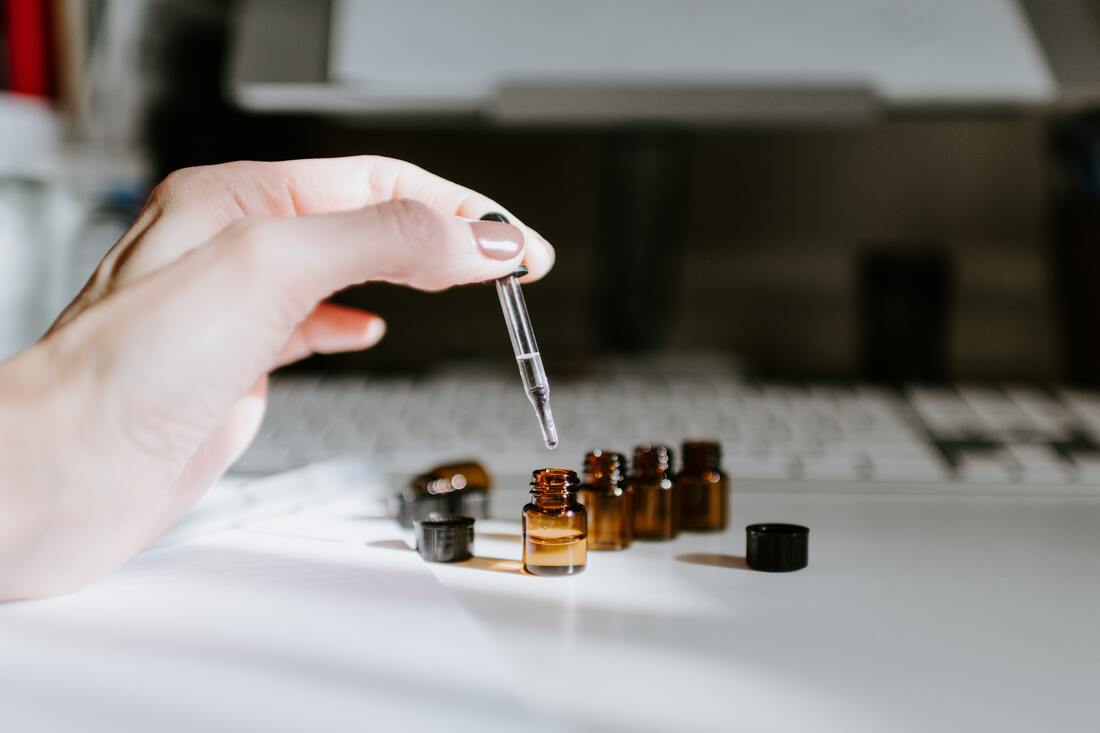|
Essential oils are great to have on hand. They can be used for a variety of purposes. Here is a list of the ones you will want to have around, and what they can be used for. 1. Lavender oil is one of the most popular essential oils. It can be used to help you sleep better, and give you fast relief when you have a sunburn. 2. Tea tree oil is great to have on hand for adding to vinegar and using the mixture to clean your home. It is antiviral, anti-fungal, antiseptic and antibiotic. 3. Chamomile oil is great for relaxation. Roman chamomile is more gentle than German chamomile, so it can be used for young babies, and is often used in homemade diaper spray solutions to soothe diaper rash. 4. Eucalyptus oil helps support respiratory health. Those suffering from asthma, bronchitis and even the common cold can benefit from diffusing this or applying it topically in diluted form. 5. Lemon oil is a great antibacterial and anti-fungal oil. If you are coming down with a cold, rub it in the palms of your hands and inhale. You can even add several drops to your load of laundry to help disinfect it. 6. Frankincense oil is great for the skin, and often used in homemade facial creams. It can be applied topically to swollen areas and used as an anti-inflammatory. 7. Peppermint oil can soothe sore muscles and relieve bad breath. It can also be sprinkled around the doors in your home to deter ants from entering. 8. Clove oil has antiseptic properties and can be used to relieve tooth pain while you are waiting for an emergency dentist appointment. 9. Grapefruit oil is a detoxifier and can be diluted and applied to cellulite-laden areas of the body to help release toxins from fat cells. 10. Ginger oil helps relieve nausea. It can also be diluted and applied to painful areas in order to experience relief. 11. Ylang ylang oil has a beautiful smell and is often used as a natural perfume. It also benefits relaxation and healthy skin. 12. Cedarwood oil can be used to clarify the skin and is a repellent for ticks, flies and gnats. 13. Citronella oil is a well-known mosquito repellent, but can also treat fevers and headaches. 14. Lemongrass oil is a common insect repellent, and can also help with digestive issues. 15. Geranium oil is great for the skin and also helps balance hormones. 16. Orange oil helps circulation and can also be used when cleaning your home, as it is not harsh and damaging to surfaces. 17. Lime oil is beneficial to diffuse when you need to stay alert. It can be added to shampoo to prevent scalp issues such as lice. 18. Rosemary oil has become the go-to oil for hair growth, by adding it to a carrier oil and applying it to the scalp. 19. Myrrh oil is great for skin health and also fights and protects against parasites when ingested. 20. Thyme oil is used for respiratory health and is antibacterial, which makes it great for use when fighting illness or cleaning the kitchen. If you could only purchase twenty essential oils, these would be the ones you should invest in. They promote health, cleanliness and work together to cover a great variety of everyday needs. Start with a few, and build your collection as you find yourself using them more and more.
0 Comments
Essential oils have been getting quite popular in recent years, but they have actually been around for thousands of years. In the past, people used essential oils for many reasons, from spiritual purposes to medication. Essential oils have a wide range of uses, and here is a little bit of information about the oils that have come to be known as nature’s pharmacy. What Are They? Essential oils are natural oils that are extracted from a plant or other source, and which retain the scent of the plant they come from. They are generally distilled. Essential oils are used for a wide variety of purposes, from diffusing them for their fragrance, to applying and inhaling them in order to receive health benefits. People have given anecdotal evidence of health problems that have been solved through the use of essential oils - from healing skin problems to reducing seasonal allergies and deterring insects. For many ailments, there are one or more oils that can help deal with the issue. There has been much anecdotal evidence of their benefits, as well as testing that shows them to be an effective way to deal with a myriad of issues. How Do You Apply Them? Essential oils are administered in three different ways. First, a person can inhale them aromatically. This can be done by using a diffuser and putting several drops of the particular essential oil into water, or just sniffing the oil directly from the bottle. The second way is to apply them topically. There are a few essential oils that can be applied directly to the skin, but a general rule if you are unsure is to first put a few drops into a carrier oil before applying. This can be anything from olive oil to coconut oil, as well as any other natural, pure carrier oil you have around the house. The third way to use oils is by ingesting them. Not all oils can be ingested, and one must be careful to take them in a way that is safe. If you are ingesting an oil, or even applying it topically, you must be sure to find essential oils that are pure and organic when possible. Because they are highly concentrated, a little goes a long way and they should be used sparingly. What Do People Use Them For? Essential oils are used for a variety of purposes, from maintenance of general health and well-being, to first aid and adding natural scent to homemade body products. You can use essential oils in the diffuser to help you to get to sleep or stay alert. You can use them to help calm frazzled nerves, and to give your immune system a boost when needed. The oils are useful when added to everything from DIY cleaning supplies to DIY skin products. They can be carried in your purse in order to help sanitize surfaces when out and about, and can help clean cuts and used in other minor accidents. You can use essential oils as bug repellent and to help heal sunburned skin. There is no end to the ways they can be used - alone, in combination, and when added to other bases. Essential oils are beneficial to add to your cabinet. They have many uses for a variety of purposes, and can help you out in a pinch. Start with a few, and add more as you become familiar with using them on a daily basis. “How can I love her one minute and hate her so much the next?” “I feel he’s my soul mate, so why do we constantly fight?” Sound familiar? If so, you are not alone. Most “love relationships” eventually turn into love/hate relationships. Feelings of love can turn into drama—hostility, attack, or withdrawal of affection—at the flick of a switch. This duality of pleasure and pain is considered “normal.” Many people believe that if you love the person it will all “work out.” Sadly, this is not the case. The reality is that the relationship will probably get worse. Other areas of your life will begin to be affected: you snap at your children more or fight in front of them, you withdraw from your friendships, or you are distracted at work. You’ll keep the cycle going for a while until it grows so destructive that the relationship finally collapses. You are trapped in an impossible addiction that maintains a destructive game: It makes you feel so good, and at the same time it is eating you alive. It might seem “normal,” but this is not what you want, is it? “Normal” is not an aspiration to strive for. If you want to stop the love/hate cycle you need to know why it happens and how to make changes before the relationship drives you crazy or ends. First, let’s look at why the drama begins. The path of a typical relationship: Circle what phase YOU are in. 1. You’re “in love.” You feel alive. Your life feels more meaningful—someone needs you, wants you, and makes you feel special. You feel whole. The feeling can be so intense that the rest of the world fades into insignificance. It feels as though you are healed—your pain is gone. (Although in reality it is just temporarily covered up.) 2. It feels great until your partner fails to meet your needs or expectations in some way. You develop a feeling of neediness and clinging. 3. You are addicted to the other person (or rather, to the euphoric feelings you experience due to the chemical reactions and hormones produced by your brain when you are “in love.”) He or she is like a drug. You are on a high when he or she is available, but even the possibility that they might not be there for you can lead you to feelings of fear, abandonment, and rejection. 4. The numbing quality of the drug wears off and you, again, feel the pain you had before the relationship. This time, however, you believe your partner is the cause. 5. This is when the drama begins. You both may begin to feel jealousy or resentment, and you take offense to practically everything your partner does and says. You become possessive and controlling, you withdraw, demand, criticize, judge, blame, and attack, all in attempt to coerce your partner to go back to meeting your needs. So, you begin the love/hate cycle—but, now you’re not just addicted to the love, you’re addicted to the drama cycle, too. It makes you feel alive. Research shows that relationships that are full of drama can be more addicting than most drugs How can this be true? Well, the simple answer is that when you fight your body has an adrenaline rush. This adrenaline eventually crashes and you calm down. Have you ever heard the phrase, “There is nothing like making up after a fight”? The reason the make-up period is great is because when you come down from the “high” you are usually apologetic and “loving”—so you both swing back into the positive-feeling addiction (and the brain releases other chemicals, such as dopamine and serotonin), making you feel happy and euphoric once again. Unfortunately, this state is short lived because, like with all drugs, your body will start looking for that “high” (adrenaline rush) all over again. Eventually the rush loses its strength, and as a result, you have to keep increasing the dose or look for alternatives to fuel the addiction. In other words, the more of a routine it becomes to fight, the more adrenaline you are going to need, and so you find yourself fighting more often and with greater intensity. Maybe the make-up period continues to feel good to you—that is, if you are looking to experience a roller coaster ride in your relationship. 24 sessions via in person, Skype or phone. This includes emails and Texts
Affiliate marketing is one way in which bloggers utilize their blog to generate revenue. The amount of revenue generated by a blog featuring affiliate marketing links may vary significantly depending on the amount of traffic the blog receives as well as the compensation offered for the affiliate marketing. Affiliate marketing essentially entails creating a link on the blog to another company’s website. The other company then compensates the blog owner according to a previously agreed upon contract. This compensation may be awarded in a number of different ways. The blog owner may be compensated each time the advertisement is served, each time a unique website visitor clicks through the advertisement or each time a blog visitor performs a desired action such as making a purchase or registering with the website. This article will discuss some aspects of affiliate marketing which bloggers should understand including selecting opportunities carefully, maximizing the income potential for these opportunities and understanding the requirements associated with these affiliate marketing opportunities. Selecting Affiliate Marketing Opportunities There is a wide variety of affiliate marketing opportunities available. Many different companies and websites offer affiliate marketing opportunities. In most cases the blog owner simply needs to submit the website address of his blog along with some other basic information for approval. In most cases the company is not likely to reject the application unless the content of the website is deemed to be objectionable or otherwise in conflict of interest with the company’s goals. However, although getting approved to display affiliate links on your website is a rather simple process, this does not mean blog owners should select these affiliate marketing opportunities without discretion. It is a far better idea to carefully select affiliate marketing opportunities with companies who are of interest to the target audience of the blog. A well focused blog that is reaching a specific target audience should seek to display marketing links directing website traffic to companies which complement the blog without acting as direct competition to the blog. This helps to ensure the blog visitors will not only be interested in the affiliate marketing links and therefore more likely to click on the links but will also help to ensure the blog visitors do not find the affiliate marketing links to be bothersome. Maximizing Affiliate Marketing Opportunities Once blog owners have selected affiliate marketing opportunities it is time to consider how they can maximize the profit generated by these links. There are a couple of critical factors which blog owners should carefully consider to help maximize their profit from affiliate marketing. This includes regularly evaluating the effectiveness of the affiliate links and promoting the blog to maximize traffic. Blog owners who incorporate affiliate marketing into their blog should regularly evaluate the effectiveness of the affiliate links. This can be done by comparing the percentage of blog visitors who click on the affiliate links to the overall blog traffic. A blog which has high traffic but a relatively small percentage of visitors who click on the affiliate links should consider making changes to attempt to entice more blog visitors to click on the links. These changes can involve the aesthetics, size or location of the advertisements. Making only one change at a time is recommended because it makes it easier for the blog owner to evaluate which changes are most beneficial. Blog owners can also help to maximize the profit from their affiliate marketing opportunities by doing self promotion to drive additional website to the blog. This will likely be beneficial because higher website traffic will generally translate to greater profit from affiliate marketing. Additionally, the blog owner may want to occasionally mention companies for which they are an affiliate to generate interest in the advertisements on the website. Understanding Affiliate Marketing Requirements Finally, blog owners should pay careful attention to the affiliate marketing agreements they enter. This is important because some companies may place restrictions on the usage of a link to their website. This may include restrictions such as avoiding objectionable content, not including links or advertisements for direct competitors or restrictions on the appearance of the affiliate links. Failure to adhere to these guidelines may result in the blog losing affiliate privileges and the blog owner being denied compensation.
|
Archives
April 2021
Categories |

 RSS Feed
RSS Feed






